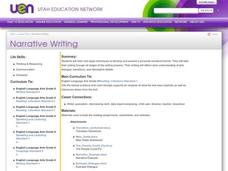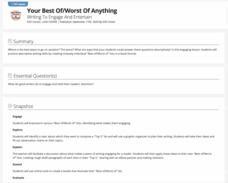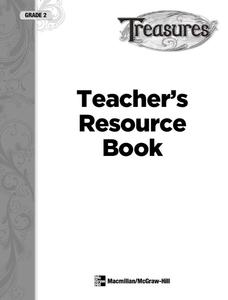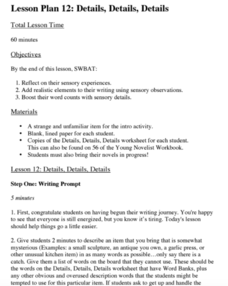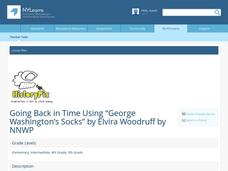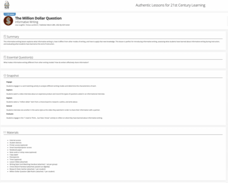K20 LEARN
Who Am I? Creating And Editing Descriptive Writing
With descriptive writing, the pleasure is in the details. Young writers learn how to add sensory details to a paragraph about themselves. They read a short paragraph and identify the sensory details used. After revising their draft...
Curated OER
Descriptive Writing: Using Art to Inspire description
Write with the senses! Try using art to inspire writers to consider all of the senses. Here, the class is divided in half. Each group looks at one of two images, imagines the senses that would be engaged, and records answers to five...
K20 LEARN
Sweet and Savory Writing: Descriptive Writing
The engagement is in the details. Young scholars learn the benefit of weaving descriptive and sensory details into the fabric of their writing through the activities in this lesson plan. As their hands explore items concealed in bags, a...
K20 LEARN
Who's Coming To Dinner? Descriptive Writing
"The Dinner Party" is the anchor text in a lesson designed to encourage writers to use sensory details in their stories. After brainstorming descriptive words and phrases for the five senses, class members read Mona Gardner's stark tale...
Curated OER
Narrative Writing
Binoculars are used as a metaphor for good descriptive writing. Class members first view a small picture and then an enlarged view of the same image in which the details come into focus. Next, learners examine a paragraph lacking sensory...
Novelinks
Walk Two Moons: Guided Imagery
Sensory details can enhance the reading experience, especially during a guided imagery reading. Young readers close their eyes and listen to a passage from Sharon Creech's Walk Two Moons before responding to discussion questions and...
K20 LEARN
Brushstrokes: Communication/Using Descriptive Language
Sometimes a picture reflects a thousand descriptive words. To illustrate the importance of sensory words in descriptive writing, scholars listen to a song and craft a painting in response. After sharing their work with the class,...
K20 LEARN
Your Best Of/Worst Of Anything: Writing To Engage And Entertain
It was the best of places! It was the worst of places! Middle schoolers practice their descriptive writing skills by creating an e-book about the best of/worst of topics. A series of activities about descriptive writing and worksheets...
K12 Reader
Describe It with Adjectives
Put children's descriptive writing skills to the test with these fun collaborative writing activities. Presented with the picture of an object, young writers are are tasked with creating a description that provides enough detail for one...
Teach with Movies
Teaching Students to Write a Narrative
Encourage narrative writing with a clever exercise. Class members watch episodes from movies and describe what happened to a character, including details about the setting, plot, and characters. Writers then craft a narrative about a...
Curated OER
Showing not telling writing
How do good writers exhibit emotion in their work without using an emotion word (angry, sad, happy, etc.)? This plan offers learners model texts that describe an emotion without using an emotion word. A well-formatted writing activity is...
McGraw Hill
Phonics Teachers Resource Book
Looking to improve your classes literacy program? Then look no further. This comprehensive collection of resources includes worksheets and activities covering everything from r-controlled vowels and consonant digraphs, to the different...
Curated OER
Further Improvements of Writing Skills
Improve writing skills by finding a personal writing style, using descriptive language effectively, and using precise language. Middle schoolers discuss individual style in writing and formal and informal language. They utilize figures...
Curated OER
Writing and Presenting a Fable Using Research
Elementary and middle schoolers research animal facts and use them in a fable. First, they pair-share to find animal traits to use in writing a fable. They then complete a prewriting worksheet. After going through the writing process,...
Curated OER
Details, Details, Details
Writing can become one-dimensional if authors don't involve all their senses. First, scholars observe a strange object which, ideally, they can touch and even smell. Without using certain words (you can create a list or have the class...
K20 LEARN
Introduction to Expository Writing
Move beyond the five-paragraph essay with a lesson introducing young writers to various forms of expository writing. Class members examine description, cause and effect, problem solution, sequence, and comparison forms. They create an...
State University of New York
Going Back in Time Using “George Washington’s Socks”
After reading Elvira Woodruff's George Washington's Socks, young readers and writers embark upon writing their own historically based story, with a focus on developing ideas and details throughout the piece. In small groups, class...
Fluence Learning
Writing an Opinion: Student Council
A three-part assessment challenges scholars to write opinion essays covering the topic of the student council. After reading three passages, writers complete a chart, work with peers to complete a mini-research project, answer...
K20 LEARN
The Million Dollar Question: Informative Writing
Introduce high school freshmen to the characteristics of informative writing with a 5-day lesson that distinguishes informative writing from other modes. Scholars learn how to search for and cite reliable resources, then research and...
Project Noah
Writing Goes Wild
Young scientists develop their observation and writing skills as they craft and then post a detailed description of a plant or animal they have spotted and photographed.
Curated OER
How Do Authors Use Imagery to Shape Their Writing?
Esther Forbes' award-winning Revolutionary War novel, Johnny Tremain and excerpts from Julie Otsuka's When the Emperor Was Divine are used to model how imagery brings alive the setting of a story. The young writers then craft their own...
Berkshire Museum
Nature Journaling: Experience the Outdoors Through Writing and Drawing
Step into the great outdoors and develop young scientists' skills of observation with a nature journaling lesson. Given a specific focus or goal, children practice making and recording observations of nature through written descriptions...
Core Knowledge Foundation
First Grade Skills Unit 4
Twenty-eight lessons make a unit that focuses on skills practice. Lessons explore r-controlled vowels, past tense verbs, nouns, adjectives, and two-syllable words. Pupils read a story, answer questions, and draft a descriptive essay...
Fluence Learning
Writing About Literature: Comparing and Contrasting Characters in Heidi
Scholars read excerpts from the story, Heidi, in a three-part assessment that focuses on comparing and contrasting characters. Each part contains three tasks that challenge learners to discuss, answer comprehension questions,...
Other popular searches
- Descriptive Writing Samples
- Beach Descriptive Writing
- Descriptive Writing Process
- Descriptive Writing Prompts
- Descriptive Writing Skills
- Descriptive Writing Lessons
- Leads + Descriptive Writing
- Leads Descriptive Writing
- Owl Moon Descriptive Writing
- Writing Descriptive Essay
- Writing a Descriptive Essay
- Descriptive Writing Frame






